This post was written for Dr. Elizabeth Fraterrigo’s Fall 2018 Women’s and Gender History course. It is part of the Sesquicentennial Blog Project, which seeks to share stories from Loyola University and Mundelein College in anticipation of Loyola’s 150th anniversary in 2020-2021.
Compared to subjects offered since Loyola’s founding, Peace Studies is a relatively new program at Loyola University Chicago. Its history, however, stretches much further back than its start in 1994 as an interdisciplinary minor. The program’s roots can be traced to Loyola’s neighbor, Mundelein College, a women’s Catholic school that operated from 1930-1991 in what is now Mundelein Center. The story of the Peace Studies program’s journey from Mundelein to Loyola is a fascinating one, and it reveals the ways people at both schools thought about the meaning of peace.
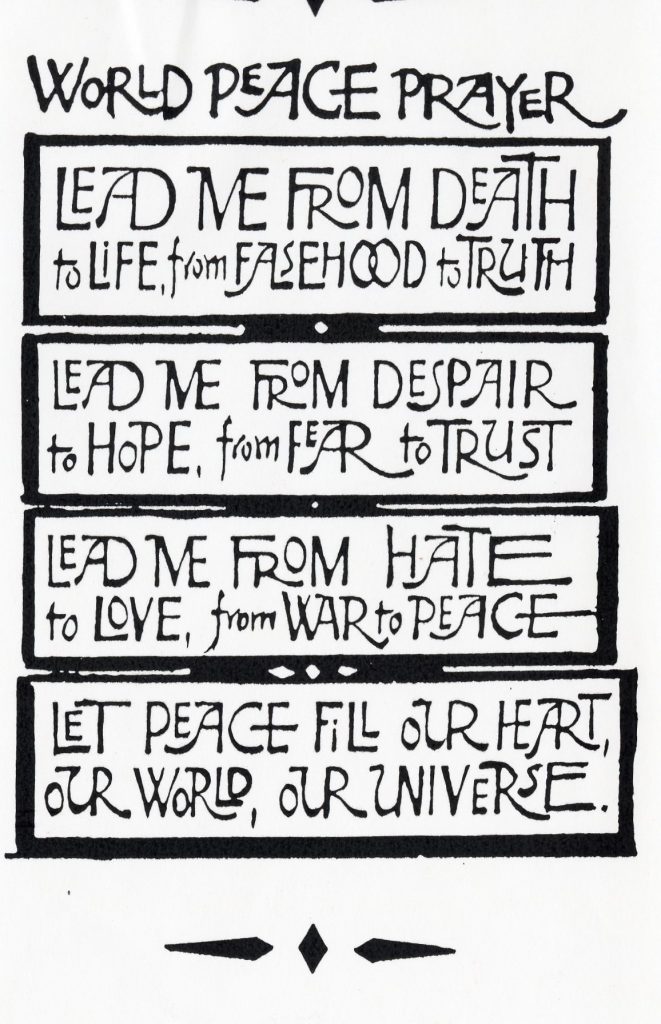
Prayer for world peace. Courtesy of Women & Leadership Archives [3].
Even as the Cold War ended, these programs continued to grow. There were just three Peace Studies programs in 1970, but by 1990, there were more than 250 [4]. During this time, university professors shifted from thinking about preventing war to actively creating a more just and sustainably peaceful society, a concept called positive peace [5].
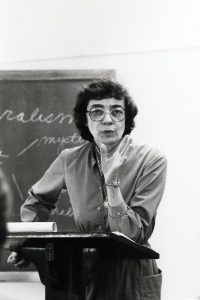
Carol Frances Jegen, BVM. Courtesy of Women & Leadership Archives [9].
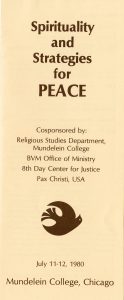
Peace conference brochure. Courtesy of Women & Leadership Archives [14].
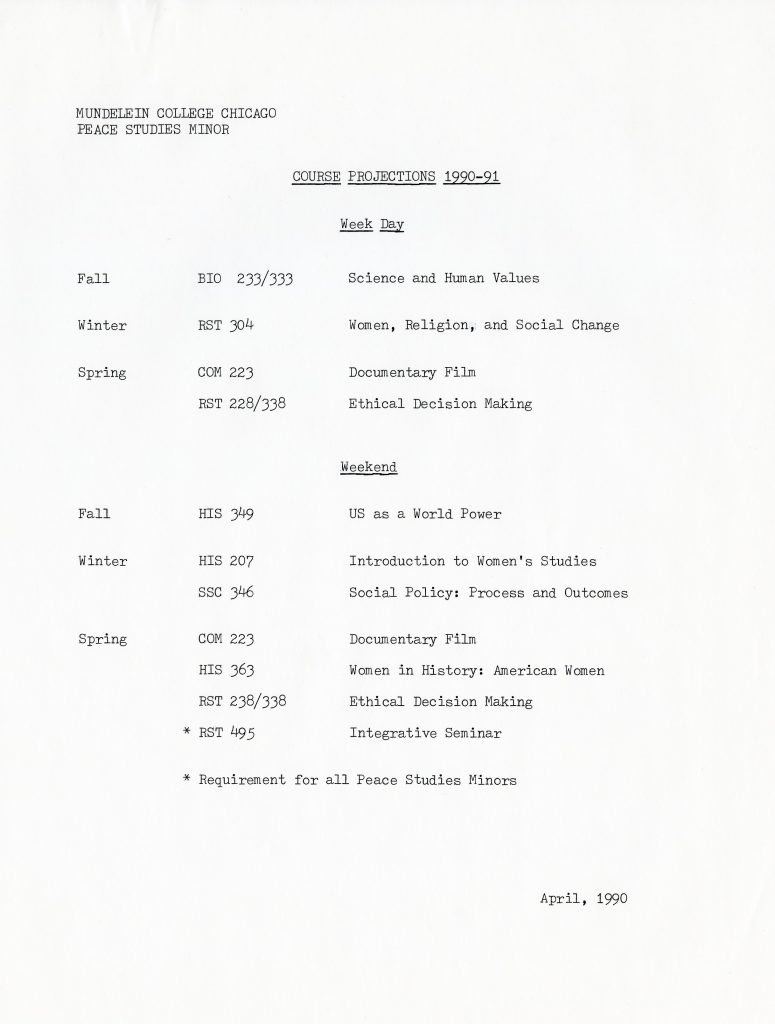
Mundelein College’s Peace Studies course projections for 1990-1991. Courtesy of Women and Leadership Archives [17].
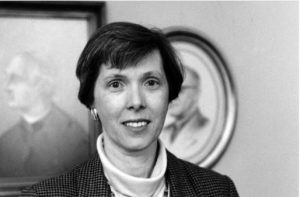
Kathleen McCourt, c. early 1990s. [23]
Before professors could create course lists or write syllabi, they had to define what peace would mean at Loyola. It soon became clear that this was easier said than done. There were two issues at the heart of the disagreement: whether to keep the emphasis on women’s studies and whether to include war in the study of peace [25]. Mundelein’s representatives on the committee argued that peace was worth studying on its own terms, and feared that women’s voices on the committee would be “drowned out” [26].
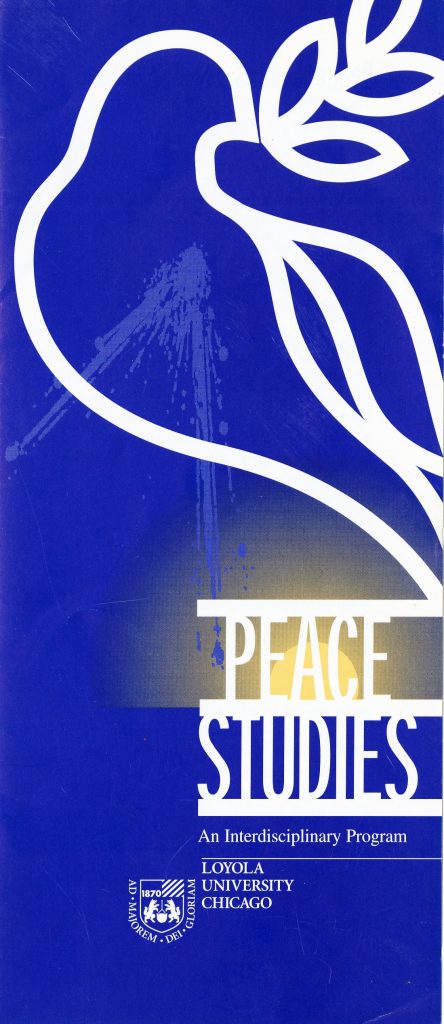
Loyola Peace Studies brochure. Courtesy of Women & Leadership Archives [30].
The minor was approved to begin at Loyola in 1994, three years after affiliation [28]. As it exists today, the program examines peace in three areas (societal, international and ecological) and on three levels of society (the interpersonal, communal, and international) [29]. Since coming to Loyola, it has changed and evolved with the university, but it still contains the interdisciplinary, activist core of the program that began at Mundelein. Whether they know it or not, students in the Peace Studies minor are experiencing part of Mundelein College’s legacy at Loyola.
Sources:
[1] French, William. Interview by Kathleen Ermitage. March 3, 2015. Oral History: The Peace Studies Program: From Mundelein to Loyola Memoir Interview Number 3, transcript, Women and Leadership Archives, Loyola University Chicago.
[2] Women and Leadership Archives, Loyola University Chicago. Peace Studies Records. Box 1. Folder 7. The Mundelein Scholar, 12 May 1989.
[3] Women and Leadership Archives, Loyola University Chicago. Peace Studies Records. Box 2. Folder 10. World Peace Prayer.
[4] Harrington, Ann M., and Prudence Moylan, eds. Mundelein Voices: The Women’s College Experience, 1930-1991. Chicago: Gannon Center for Women and Leadership, 2001. 117.
[5] Moylan, Prudence. Interview by Kathleen Ermitage. March 26, 2015. Oral History: The Peace Studies Program: From Mundelein to Loyola Memoir Interview Number 4, transcript, Women and Leadership Archives, Loyola University Chicago.
[6] Ibid.
Women and Leadership Archives, Loyola University Chicago. Peace Studies Records. Box 1. Folder 1. Memo on Mundelein’s Justice Peace Involvement, January 1980.
[7] Women and Leadership Archives, Loyola University Chicago. The Peace Studies Origins: From Mundelein College to Loyola University Chicago. Accessed Nov. 26, 2018. http://libapps.luc.edu/digitalexhibits/s/peace-studies-oral-history-project/page/home.
[8] McCourt, Kathleen. Interview by Kathleen Ermitage. January 22, 2015. Oral History: The Peace Studies Program: From Mundelein to Loyola Memoir Interview Number 1, transcript, Women and Leadership Archives, Loyola University Chicago.
[9] Women and Leadership Archives, Loyola University Chicago. Mundelein College Records. Photo Collection. Jegen, Carol Frances, BVM.
[10] Moylan, Prudence. Interview by Kathleen Ermitage. March 26, 2015. Oral History: The Peace Studies Program: From Mundelein to Loyola Memoir Interview Number 4, transcript, Women and Leadership Archives, Loyola University Chicago.
[11] Women and Leadership Archives, Loyola University Chicago. Peace Studies Records. Box 1. Folder 14.
[12] Women and Leadership Archives, Loyola University Chicago. Peace Studies Records. Box 1. Folder 2.
Women and Leadership Archives, Loyola University Chicago. Peace Studies Records. Box 2. Folder 2.
[13] Women and Leadership Archives, Loyola University Chicago. Peace Studies Records. Box 1. Folder 5. Memo, Sept. 9, 1989.
[14] Women and Leadership Archives, Loyola University Chicago. Peace Studies Records. Box 1. Folder 1. Spirituality and Strategies for Peace.
[15] Women and Leadership Archives, Loyola University Chicago. Peace Studies Records. Box 1. Folder 5.
[16] Ibid.
[17] Women and Leadership Archives, Loyola University Chicago. Peace Studies Records. Box 1. Folder 3. Course Projections 1990-91.
[18] Moylan, Prudence. Interview by Kathleen Ermitage. March 26, 2015. Oral History: The Peace Studies Program: From Mundelein to Loyola Memoir Interview Number 4, transcript, Women and Leadership Archives, Loyola University Chicago.
[19] Women and Leadership Archives, Loyola University Chicago. Peace Studies Records. Box 1. Folder 14. Linking Women’s Studies and Peace Studies in the College Curriculum.
[20] Women and Leadership Archives, Loyola University Chicago. Peace Studies Records. Box 1. Folder 14. Peace Studies and Women’s Studies – May 18 Meeting.
[21] Women and Leadership Archives, Loyola University Chicago. Peace Studies Records. Box 3. Folder 13.
[22] Poulson, Sarah L., and Leslie Miller-Bernal, eds. Challenged by Coeducation: Women’s Colleges Since the 1960s. Nashville: Vanderbilt University Press, 2006. 97.
[23] Women and Leadership Archives, Loyola University Chicago. “Professor Kathleen McCourt.” The Peace Studies Origins: From Mundelein College to Loyola University Chicago. Accessed Nov. 26, 2018. http://libapps.luc.edu/digitalexhibits/s/peace-studies-oral-history-project/page/interview-with-prof-kathleen-mccourt.
[24] Ibid.
[25] French, William. Interview by Kathleen Ermitage. March 3, 2015. Oral History: The Peace Studies Program: From Mundelein to Loyola Memoir Interview Number 3, transcript, Women and Leadership Archives, Loyola University Chicago.
[26] Parrella, Gilda. Interview by Kathleen Ermitage. February 25, 2015. Oral History: The Peace Studies Program: From Mundelein to Loyola Memoir Interview Number 2, transcript, Women and Leadership Archives, Loyola University Chicago.
[27] McCourt, Kathleen. Interview by Kathleen Ermitage. January 22, 2015. Oral History: The Peace Studies Program: From Mundelein to Loyola Memoir Interview Number 1, transcript, Women and Leadership Archives, Loyola University Chicago.
[28] Women and Leadership Archives, Loyola University Chicago. Peace Studies Records. Box 3. Folder 10.
[29] Loyola University Chicago. “About Us.” Peace Studies. Accessed Nov. 27, 2018. https://www.luc.edu/peace/aboutus/.
[30] Women and Leadership Archives, Loyola University Chicago. Peace Studies Records. Box 3. Folder 11. Peace Studies: An Interdisciplinary Program.
Hannah is a Sesquicentennial Scholar at the WLA and is in her first year in the MA in Public History at Loyola University Chicago. She is originally from central Indiana and enjoys cycling, science fiction, and trying out new vegetarian recipes. She can usually be found in the nearest museum.
Loyola University Chicago’s Women and Leadership Archives Blog is designed to provide a positive environment for the Loyola community to discuss important issues and ideas. Differences of opinion are encouraged. We invite comments in response to posts and ask that you write in a civil and respectful manner. All comments will be screened for tone and content and must include the first and last name of the author and a valid email address. The appearance of comments on the blog does not imply the University’s endorsement or acceptance of views expressed.
